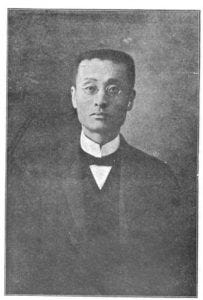Biohacking in China, circa 1915? Or Skipping Breakfast to Save the World?
By Hilary A. Smith, Ph.D.
Intermittent fasting is trending these days. News articles about it are proliferating, celebrities are endorsing it, and the Internet is replete with beginner’s guides to different forms of this way of eating. Its proponents say that it promotes weight loss, lowers insulin levels, and normalizes blood pressure. Others warn that it can be dangerous—for those with a history of disordered eating, for example, or pregnant women. But the enthusiasm radiating from blogs and fitness websites is hard to ignore. Nor is this enthusiasm confined to American pop culture: jianxiexing duanshi 间歇性断食 is attracting attention in the Sinosphere as well.
Source of image: https://www.taiwannutrition.com/blog/intermittent-fasting/. Accessed August 5, 2019.
Trendy though it is today, the idea is hardly new . I’ve been reading Chinese and Japanese books from the early twentieth century, and I came across one that radiates very similar enthusiasm for very similar advice: Jiang Weiqiao 蔣維喬’s On Skipping Breakfast for Health and to Prevent Aging (健康不老廢止朝食論). I’ll just call it On Skipping Breakfast from here on, for simplicity. This book claims that by eating only two meals per day, one slightly before noon and one in the early evening, anyone can improve his health and extend his lifespan. Following this advice, it says, can strengthen cases of weak nerves and prevent conditions such as depression, diabetes and obesity, constipation, and even cholera and typhoid. And, as if that weren’t enough, it gives the eater more time, improves his mental clarity, and makes him more successful in his career. When Twitter CEO Jack Dorsey says that intermittent fasting “helps him save time, stay focused, and sleep better at night,” it’s almost as if he’s quoting Jiang.[1]Or actually, quoting Mishima Kin’ichirō 美島金一郎,since Jiang’s book is a modified translation of a Japanese book published a year earlier.
But On Skipping Breakfast is not just an example of biohacking before Silicon Valley. While Mishima’s original text does celebrate the potential to lighten the body and boost productivity, Jiang’s version has higher aims: his ambition is to “arrive at a world of great harmony” by promoting moderate eating.
When the Commercial Press published the book in 1915, Western scientific ideas about eating were beginning to permeate China. Increasingly, diets were defined, measured, and quantified as the concepts of calories, vitamins, and minimum daily requirements took root. Underpinning much of this knowledge was a conviction that Western diets were superior to what people ate in East Asia. Scientists as well as political and cultural leaders decried Chinese diets as deficient—in proteins, in calories, in micronutrients and in just about every other way. Modernizers in China, like those in other weak countries, wanted their people to adopt what Rachel Laudan has called the “power cuisine” of the West, a high-calorie feast featuring meat, wheat, and dairy.[2]The goal was to create a taller, stronger, and generally more “fit” population that could better compete in the nations’ struggle for survival.
On Skipping Breakfast, though, approaches the question of national diet very differently. It’s not that Jiang rejects modern knowledge. By choosing to translate Mishima’s tract in all its scientistic glory, Jiang demonstrates his fascination with then-current physiological and anatomical ideas. The body described in this book is clearly the body of Western science, not the one of classical Chinese medicine: it has blood but no qi, yingyang (營養, the neologism “nutrition”) but no yin 陰 or yang 陽, and a mind-hosting brain instead of a heart-mind (xin 心), among many other marks. The book revels in mechanistic descriptions of digestion and excretion. But Jiang harnesses these ideas to a very different goal from the usual one of bulking up to better compete.[3]
Jiang Weiqiao, from his book 因是子靜坐法 (Shanghai: The Commercial Press, 1922). Available through Hathi Trust.
In a preface added to Mishima’s original text, Jiang affirms the Darwinian premise that all living beings are locked in a struggle for survival. But his response sounds like a Buddhist one:
“if there were a way to make living things able to not rely on food to live, then their conflict and killing one another perhaps could be stopped. If there were a way to … make living things return and not be reborn and not die … [t]he conflict and mutual killing could forever not be aroused.”
Unfortunately, he writes,
“there is not yet a good method of not eating. So we will use eating in moderation to save [people]. When there have been generations who have practiced healthy, anti-aging [practices like these] for a long time, this can build up their self-cultivation and produce wisdom, and engrave the truth of no-rebirth.”[4]
Here the goal is not to win the competition but to transcend it. Rather than improving their stock by eating more animal protein and calories, nations can improve their moral essence by eating in a disciplined and economical pattern. Jiang’s perspective echoes not only Buddhist ideals but also Daoist practices like abstaining from grain. It resonates, too, with what Chinese medical classics say about moderating what you eat and drink.
Despite (or perhaps because of) its ties to traditional culture, On Skipping Breakfast clearly remained a contrarian piece. China did indeed absorb Western “power cuisine.” A century later, the attendant problems of a calorie-dense diet heavier in meat, wheat, and dairy have cropped up there, including rising rates of obesity, diabetes, and high blood pressure. No wonder, then, that these days intermittent fasting is attracting attention in Chinese societies too. Today, though, you’re less likely to hear about its potential to save humanity.
[1] Aria Bendix and Julia Naftulin, “Twitter CEO Jack Dorsey says he eats only one meal a day and fasts all weekend,” Business Insider April 12, 2019 (https://www.businessinsider.com/jack-dorsey-intermittent-fasting-diet-risks-2019-4)
[2] Rachel Laudan, Cuisine and Empire: Cooking in World History (Berkeley: University of California Press, 2013), 255-257.
[3] Hilary A. Smith, “Skipping Breakfast to Save the Nation: A Different Kind of Dietary Determinism in Early Twentieth-Century China,” Global Food History vol.4, no.2 (2018): 152-167.
[4] Jiang Weiqiao, Jiankang bulao feizhi zhaoshi lun [Skipping Breakfast for Health and to Prevent Aging] (Taipei: Xin wen feng, 1980), author’s preface 2 and 5.


